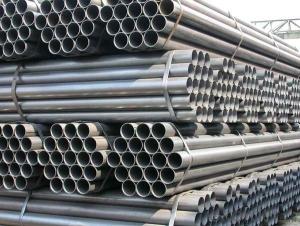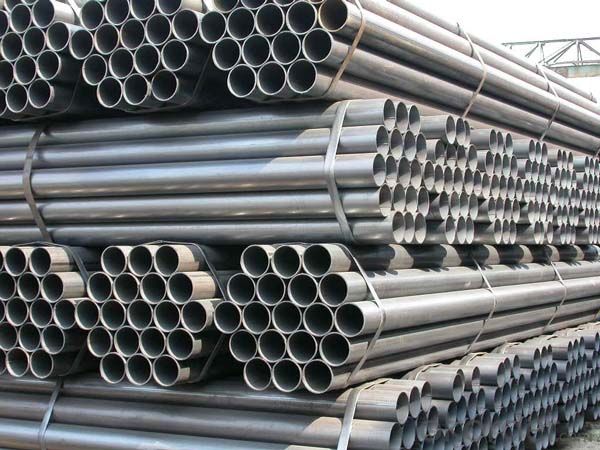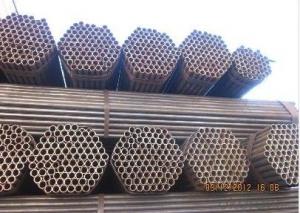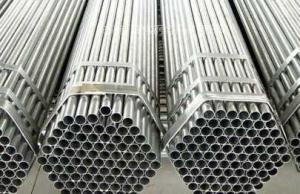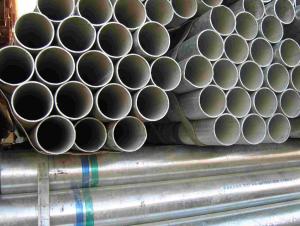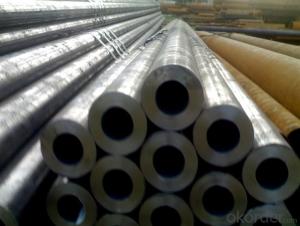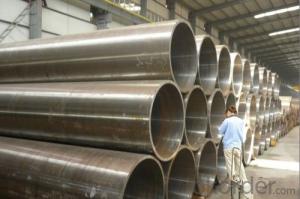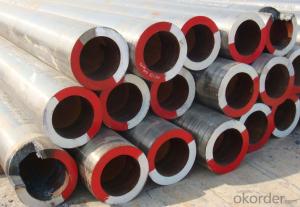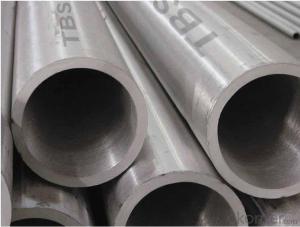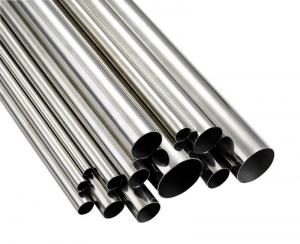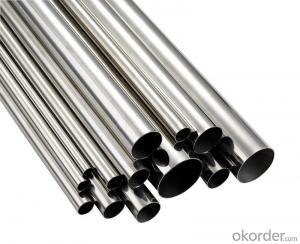Seamless Ferritic Alloy-Steel Pipe for High-Temperature Service
- Loading Port:
- Shanghai
- Payment Terms:
- TT or LC
- Min Order Qty:
- 1000 kg
- Supply Capability:
- 10000 kg/month
OKorder Service Pledge
OKorder Financial Service
You Might Also Like
Packaging & Delivery
| Packaging Detail: | the packing is at your choice,we will adjust to meeting your demand. |
| Delivery Detail: | 10-30 days |
Specifications
suitable for bending, flanging and similar forming operations ,for fusion welding,containing up to and including 10 % chromium
1.BV certificate
2.product itself
(1) nominal wall and minimum wall seamless ferritic alloy-steel pipe intended for high-temperature service. Pipe ordered to this specification shall be suitable for bending, flanging (vanstoning), and similar forming operations, and for fusion welding.
(2)Each length of pipe is subjected to the hydrostatic test and examined by a non-destructive examination method in accordance to the required practices. The range of pipe sizes that may be examined by each method is subjected to the limitations in the scope of the respective practices. The different mechanical test requirements for pipes has been passed.
(3)Ferritic steels are defined as low- and intermediate-alloy steels containing up to and including 10 % chromium.
Information of Steel Tube/Pipe
Item | stainless steel pipe / stainless steel tube |
Description | Stainless steel pipe,stainless steel seamless tube, stainless steel welded tube,stainless steel tube, stainless steel round tube ,stainless steel square tube |
Standard | ASTM,AISI,SUS,JIS,EN,DIN,BS,GB |
Material | 201,202,304,304L,304N,304LN,309S,310S,316,316L, 316N,316LN,316Ti,317,317L,321,347H,347,etc. |
Finish(Surface) | Pickled finish Mill Finish,80grit,160grit,600grit,polished finish, bright finish,decoration finish and so on |
Exported Area | USA,UAE,Europe,Asia,Middle East,Africa,South America |
Outside Diameter | From 6mm~2500mm ( 1/8 inch,1/4 inch, 1/2 inch,3/4 inch, 1inch, 1 1/4 inch ,1 1/2 inch, 2inch,2 1/2 inch,3inch, 3 1/2 inch, 4inch,5 inch, 6inch, 8 inch, 10 inch, 12inch, 14inch, 16 inch, 18 inch, 20 inch, 22 inch, 24 inch, 26inch, 28 inch,30 inch, 32 inch,34 inch, 36 inch, 38 inch, 40 inch, 42 inch,44 inch, 46 inch, 48 inch) |
Wall Thickness | From 1mm-150mm (SCH5 ,SCH10,SCH20,SCH30,STD,SCH40,SCH60, XS,SCH80,SCH100,SCH120,SCH140,SCH160, XXS) |
Length | 5.8m,6m ,20FT or we can make the length as your required |
Application | Stainless steel pipe applies to petroleum,chemical industry,electric power,boiler, hightemperatureresistantance,lowtemperature resistantance , corrosion resistantance. Stainless steel pipe can be made according to customers' requirements |
Package Details | Standard seaworthy package (wooden boxes package ,pvc package, and other package) |
Delivery Time | According to your size and quantity or as customers require |
Payment Term | T/T ,L/C, Western Union |
Contact | If you have any questions, please feel free to contact me. |
Packaging Detail: | Bundle or Container or as per customers requirement. |
Delivery Detail: | within 25 days after we receive an irrevocable L/Cor 30% deposit |
ASTM A335 Seamless Alloy-Steel Pipe
Standard: BS 1139, BS 3059-2, JIS G3454-2007
Grade: 10#-45#, 15NiCuMoNb5, 10Cr9Mo1VNb
Detailed introduction to ASTM A335 seamless alloy steel pipe:
ASTM A335 seamless alloy steel pipe
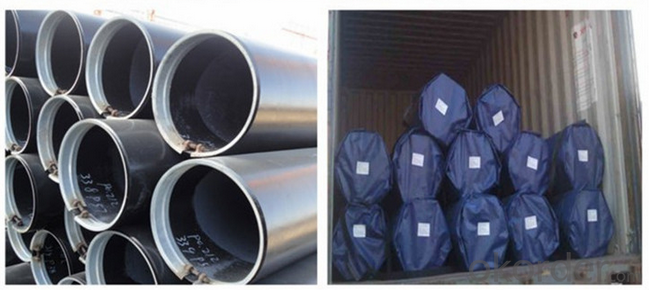
FAQ:
1) why you chose us ?
Professional Manufacturer and supplier of Steel pipe
More than 14 years’ professional producing experience
We can get the lowest ex-factory prices. The price are quite reasonable and it is lower than our commercial peers. also, we can guarantee the qualities of our products.
BV, ISO certificates and SGS test can be provided to assure the quality of our products.
2) Our minimum order quantity:
10 Metric Tons or one 20ft or 40ft Container.
3) How about the Delivery Time?
The steel pipe will be produced since we getting your deposit by T/T or Your original L/C. For normal size, some stocks in our factory now, we can supply once you need.
4)What kind of payment does your company support?
T/T, 100% L/C at sight, Cash, Western Union are all accepted.
5) Do you charge for the samples?
According to our company principle, we just charge for samples, you pay for the freight /courier charge.
6) Main market:
Mid East, South America, Africa, Southeast Asia, India etc
- Q: What are the safety regulations for working with steel pipes?
- The safety regulations for working with steel pipes may vary depending on the specific circumstances and location, but some common safety measures include wearing appropriate personal protective equipment (PPE) such as gloves, safety glasses, and steel-toed boots, ensuring proper handling techniques to prevent injuries, using proper lifting equipment to prevent strain or back injuries, implementing proper ventilation and respiratory protection when working in confined or poorly ventilated spaces, and following proper procedures for welding, cutting, or bending steel pipes to minimize the risk of fire or explosions. It is essential to consult and adhere to local safety regulations and guidelines to ensure a safe working environment when dealing with steel pipes.
- Q: What are the different methods of pipe coating for steel pipes?
- There are several methods of pipe coating for steel pipes, including fusion-bonded epoxy (FBE) coating, three-layer polyethylene (3LPE) coating, three-layer polypropylene (3LPP) coating, and liquid epoxy coating. Each method offers different levels of protection against corrosion, abrasion, and other environmental factors, ensuring the durability and longevity of the steel pipes.
- Q: What is the difference between carbon steel and alloy steel pipes?
- Carbon steel and alloy steel pipes are both types of steel pipes, but they differ in their composition and properties. Carbon steel pipes are made primarily from carbon and iron, with small amounts of other elements such as manganese, silicon, and copper. They are known for their strength and durability, making them a popular choice for various applications in industries such as construction, oil and gas, and automotive. Carbon steel pipes are relatively inexpensive and have good resistance to corrosion. On the other hand, alloy steel pipes are made by adding other alloying elements to carbon steel. These alloying elements can include elements such as chromium, nickel, molybdenum, and vanadium, among others. The addition of these elements enhances the properties of the steel, such as increased strength, improved corrosion resistance, and better heat resistance. Alloy steel pipes are commonly used in high-temperature and high-pressure applications, such as in power plants, refineries, and chemical plants. In terms of cost, alloy steel pipes are generally more expensive than carbon steel pipes due to the additional alloying elements. However, the added benefits in performance and durability can often justify the higher cost. In summary, the main difference between carbon steel and alloy steel pipes lies in their composition and properties. Carbon steel pipes are primarily made of carbon and iron, while alloy steel pipes contain additional alloying elements for enhanced properties. Carbon steel pipes are known for their strength and affordability, while alloy steel pipes offer improved strength, corrosion resistance, and heat resistance.
- Q: What are the lengths of scaffold steel tubes?
- Scaffolding steel pipe standard length is 6 meters, for easy use, respectively, 6 meters, 3 meters, 2 meters, 1.5 meters, 1 meters, etc., if there is a special length, you need to intercept.
- Q: Can steel pipes be used for wastewater treatment systems?
- Yes, steel pipes can be used for wastewater treatment systems. Steel pipes are commonly used in wastewater treatment systems due to their durability, corrosion resistance, and ability to withstand high pressures and temperatures. Additionally, steel pipes can be easily welded and have a long lifespan, making them a suitable choice for transporting and distributing wastewater within treatment facilities.
- Q: How are steel pipes used in the pharmaceutical industry?
- Steel pipes are used in the pharmaceutical industry for various purposes, including the transportation of liquids, gases, and chemicals, as well as for the distribution of water and steam. They provide a reliable and durable solution for the safe and efficient transfer of pharmaceutical products within manufacturing facilities and during distribution processes.
- Q: What are the safety considerations while handling steel pipes?
- When handling steel pipes, some key safety considerations include wearing appropriate personal protective equipment (PPE) such as gloves, safety glasses, and steel-toe boots to protect against potential injuries. It is important to be cautious of the weight and size of the pipes, using proper lifting techniques and equipment to prevent strains or accidents. Additionally, workers should be mindful of the sharp edges and potential for cuts or punctures, ensuring they have a clear and organized workspace to minimize the risk of tripping or falling. Regular inspections of the pipes for any damages or defects are also crucial to prevent accidents and maintain a safe working environment.
- Q: Water, gas, steel pipes, thick steel wire means?
- Water pipes, gas pipes and other collectively known as water gas pipe, generally galvanized steel pipe, so it can be called water and gas pipe. Most of them are welded steel tubes made of low carbon steel.
- Q: Can steel pipes be used for irrigation pumps?
- Yes, steel pipes can be used for irrigation pumps. Steel pipes are commonly used in irrigation systems due to their durability, strength, and resistance to corrosion. They can efficiently transport water from the pump to the irrigation fields, ensuring a reliable and long-lasting solution for irrigation needs.
- Q: What is the difference between steel pipes and concrete-lined pipes?
- The main difference between steel pipes and concrete-lined pipes lies in their composition and structural properties. Steel pipes are primarily made of steel, which provides strength, durability, and resistance to corrosion. On the other hand, concrete-lined pipes are steel pipes that have been coated with a layer of concrete. This concrete lining adds an extra layer of protection against corrosion and also provides additional structural stability. Concrete-lined pipes are commonly used in applications where protection against corrosion and abrasion is crucial, such as in water distribution systems or sewage pipelines. In contrast, steel pipes are often used in various industries where strength and durability are vital, such as oil and gas pipelines or structural applications.
Send your message to us
Seamless Ferritic Alloy-Steel Pipe for High-Temperature Service
- Loading Port:
- Shanghai
- Payment Terms:
- TT or LC
- Min Order Qty:
- 1000 kg
- Supply Capability:
- 10000 kg/month
OKorder Service Pledge
OKorder Financial Service
Similar products
Hot products
Hot Searches
Related keywords
